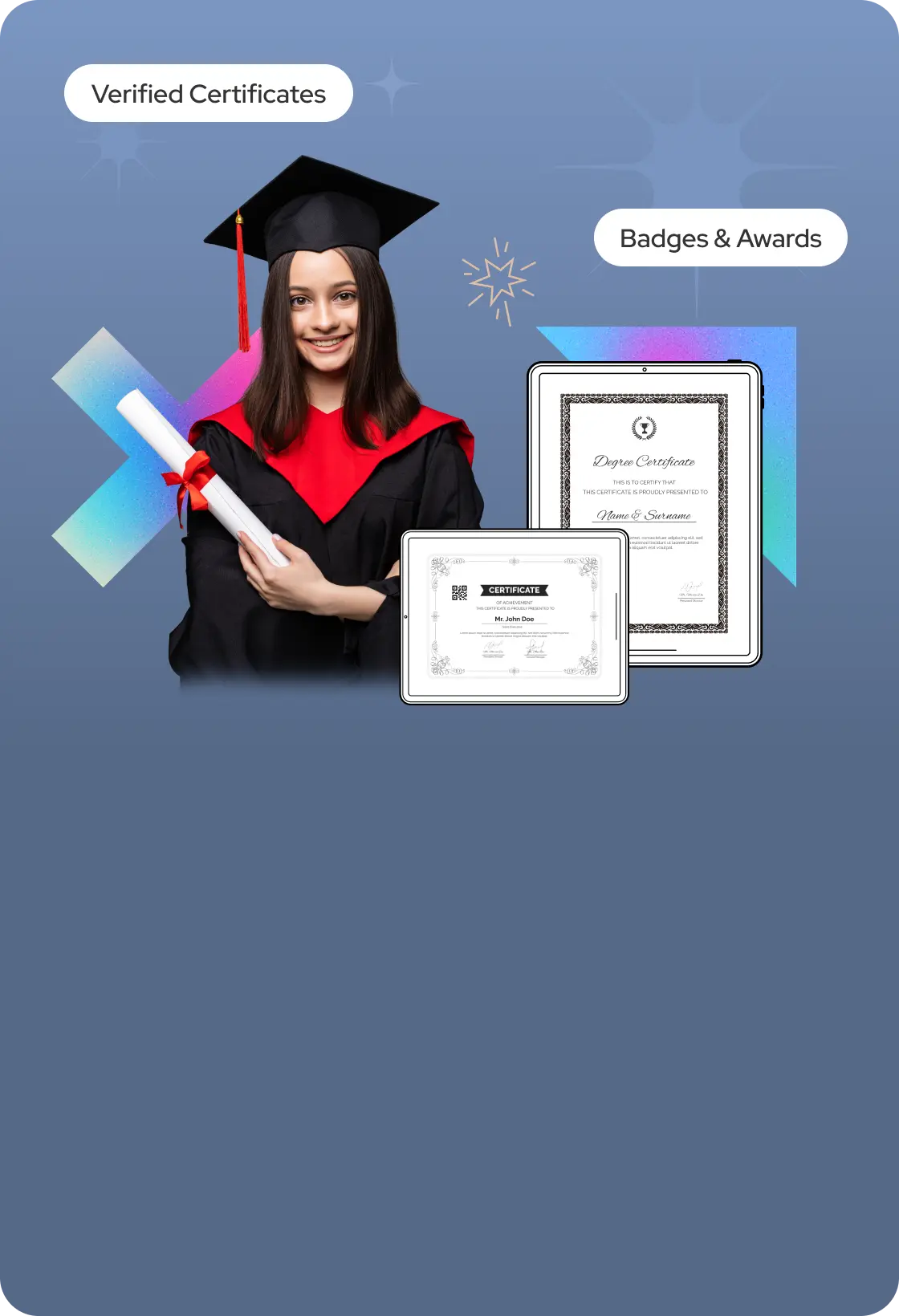Digital Credentials
Digital Credentials
Digital Credentials
Why Digital Credentials Are Becoming a Global Standard for Skill Recognition
Why Digital Credentials Are Becoming a Global Standard for Skill Recognition
Why Digital Credentials Are Becoming a Global Standard for Skill Recognition
27 Feb 2025
27 Feb 2025
27 Feb 2025



What Are Digital Credentials?
Digital credentials are electronic representations of skills, qualifications, or achievements earned through education, training, or work experience. Unlike traditional paper certificates, digital credentials can be easily shared, verified, and stored online. They often come in the form of blockchain-backed badges, certificates, or digital transcripts, ensuring security and authenticity.
Challenges of Implementing Digital Credentials in the Global Workforce
Standardization Across Borders
One of the biggest challenges is the lack of a universal framework for digital credentials. Different countries and industries have varying standards, making it difficult to implement a seamless, globally recognized system. Organizations such as the World Economic Forum (WEF) and UNESCO are working to establish global interoperability standards.
Technology Barriers
Not all organizations and institutions have the infrastructure to support digital credentials. Developing countries and smaller businesses may struggle with the technical requirements, such as blockchain implementation or cloud-based credential storage.
Security and Privacy
While digital credentials offer enhanced security, they are still vulnerable to cyberattacks, data breaches, and identity fraud. Ensuring secure encryption, authentication, and compliance with data privacy laws (e.g., GDPR, CCPA) is essential.
Trust and Credibility
Employers and institutions need to trust the authenticity of digital credentials. Without proper verification mechanisms, there is a risk of credential fraud or manipulation. Blockchain technology is being increasingly adopted to enhance trust and transparency.
Integration with Existing Systems
Many organizations rely on legacy HR and learning management systems (LMS) that may not be compatible with digital credential platforms. Ensuring smooth integration requires investment in API-based solutions and cooperation between vendors.
Benefits of Implementing Digital Credentials for Skill Recognition
Enhanced Skill Verification
Digital credentials eliminate forgery and credential fraud by providing real-time verification through blockchain or encrypted systems. Employers can instantly confirm an individual's qualifications, reducing hiring risks.
Increased Accessibility
Individuals can store and share their credentials anytime, anywhere, without worrying about lost or damaged certificates. This enhances employment opportunities, especially for remote and freelance workers.
Learning and Development
Digital credentials allow professionals to showcase continuous learning and upskilling efforts. Employees can accumulate micro-credentials over time, demonstrating lifelong learning to employers.
Recruitment and Hiring
Employers can automate the screening process by verifying digital credentials quickly, reducing recruitment time and costs. This enables HR teams to focus on skills-based hiring rather than relying on traditional resumes.
Lifelong Learning
Digital credentials support personalized learning pathways by allowing individuals to earn, track, and display skills across different industries and career stages. Educational institutions and corporate training programs benefit from real-time skill tracking.
Enhanced Career Mobility
A globally accepted digital credential system enables professionals to move seamlessly across industries and countries. Employers can easily evaluate skills, leading to better job matching and career growth.
Conclusion
Digital credentials are revolutionizing skill recognition by providing a secure, standardized, and globally accepted proof of expertise. While challenges such as standardization, security, and integration persist, the benefits of enhanced verification, accessibility, and career mobility outweigh these hurdles. As technology continues to evolve, digital credentials will become the cornerstone of the modern workforce, ensuring transparency, trust, and lifelong learning opportunities for professionals worldwide.
What Are Digital Credentials?
Digital credentials are electronic representations of skills, qualifications, or achievements earned through education, training, or work experience. Unlike traditional paper certificates, digital credentials can be easily shared, verified, and stored online. They often come in the form of blockchain-backed badges, certificates, or digital transcripts, ensuring security and authenticity.
Challenges of Implementing Digital Credentials in the Global Workforce
Standardization Across Borders
One of the biggest challenges is the lack of a universal framework for digital credentials. Different countries and industries have varying standards, making it difficult to implement a seamless, globally recognized system. Organizations such as the World Economic Forum (WEF) and UNESCO are working to establish global interoperability standards.
Technology Barriers
Not all organizations and institutions have the infrastructure to support digital credentials. Developing countries and smaller businesses may struggle with the technical requirements, such as blockchain implementation or cloud-based credential storage.
Security and Privacy
While digital credentials offer enhanced security, they are still vulnerable to cyberattacks, data breaches, and identity fraud. Ensuring secure encryption, authentication, and compliance with data privacy laws (e.g., GDPR, CCPA) is essential.
Trust and Credibility
Employers and institutions need to trust the authenticity of digital credentials. Without proper verification mechanisms, there is a risk of credential fraud or manipulation. Blockchain technology is being increasingly adopted to enhance trust and transparency.
Integration with Existing Systems
Many organizations rely on legacy HR and learning management systems (LMS) that may not be compatible with digital credential platforms. Ensuring smooth integration requires investment in API-based solutions and cooperation between vendors.
Benefits of Implementing Digital Credentials for Skill Recognition
Enhanced Skill Verification
Digital credentials eliminate forgery and credential fraud by providing real-time verification through blockchain or encrypted systems. Employers can instantly confirm an individual's qualifications, reducing hiring risks.
Increased Accessibility
Individuals can store and share their credentials anytime, anywhere, without worrying about lost or damaged certificates. This enhances employment opportunities, especially for remote and freelance workers.
Learning and Development
Digital credentials allow professionals to showcase continuous learning and upskilling efforts. Employees can accumulate micro-credentials over time, demonstrating lifelong learning to employers.
Recruitment and Hiring
Employers can automate the screening process by verifying digital credentials quickly, reducing recruitment time and costs. This enables HR teams to focus on skills-based hiring rather than relying on traditional resumes.
Lifelong Learning
Digital credentials support personalized learning pathways by allowing individuals to earn, track, and display skills across different industries and career stages. Educational institutions and corporate training programs benefit from real-time skill tracking.
Enhanced Career Mobility
A globally accepted digital credential system enables professionals to move seamlessly across industries and countries. Employers can easily evaluate skills, leading to better job matching and career growth.
Conclusion
Digital credentials are revolutionizing skill recognition by providing a secure, standardized, and globally accepted proof of expertise. While challenges such as standardization, security, and integration persist, the benefits of enhanced verification, accessibility, and career mobility outweigh these hurdles. As technology continues to evolve, digital credentials will become the cornerstone of the modern workforce, ensuring transparency, trust, and lifelong learning opportunities for professionals worldwide.
What Are Digital Credentials?
Digital credentials are electronic representations of skills, qualifications, or achievements earned through education, training, or work experience. Unlike traditional paper certificates, digital credentials can be easily shared, verified, and stored online. They often come in the form of blockchain-backed badges, certificates, or digital transcripts, ensuring security and authenticity.
Challenges of Implementing Digital Credentials in the Global Workforce
Standardization Across Borders
One of the biggest challenges is the lack of a universal framework for digital credentials. Different countries and industries have varying standards, making it difficult to implement a seamless, globally recognized system. Organizations such as the World Economic Forum (WEF) and UNESCO are working to establish global interoperability standards.
Technology Barriers
Not all organizations and institutions have the infrastructure to support digital credentials. Developing countries and smaller businesses may struggle with the technical requirements, such as blockchain implementation or cloud-based credential storage.
Security and Privacy
While digital credentials offer enhanced security, they are still vulnerable to cyberattacks, data breaches, and identity fraud. Ensuring secure encryption, authentication, and compliance with data privacy laws (e.g., GDPR, CCPA) is essential.
Trust and Credibility
Employers and institutions need to trust the authenticity of digital credentials. Without proper verification mechanisms, there is a risk of credential fraud or manipulation. Blockchain technology is being increasingly adopted to enhance trust and transparency.
Integration with Existing Systems
Many organizations rely on legacy HR and learning management systems (LMS) that may not be compatible with digital credential platforms. Ensuring smooth integration requires investment in API-based solutions and cooperation between vendors.
Benefits of Implementing Digital Credentials for Skill Recognition
Enhanced Skill Verification
Digital credentials eliminate forgery and credential fraud by providing real-time verification through blockchain or encrypted systems. Employers can instantly confirm an individual's qualifications, reducing hiring risks.
Increased Accessibility
Individuals can store and share their credentials anytime, anywhere, without worrying about lost or damaged certificates. This enhances employment opportunities, especially for remote and freelance workers.
Learning and Development
Digital credentials allow professionals to showcase continuous learning and upskilling efforts. Employees can accumulate micro-credentials over time, demonstrating lifelong learning to employers.
Recruitment and Hiring
Employers can automate the screening process by verifying digital credentials quickly, reducing recruitment time and costs. This enables HR teams to focus on skills-based hiring rather than relying on traditional resumes.
Lifelong Learning
Digital credentials support personalized learning pathways by allowing individuals to earn, track, and display skills across different industries and career stages. Educational institutions and corporate training programs benefit from real-time skill tracking.
Enhanced Career Mobility
A globally accepted digital credential system enables professionals to move seamlessly across industries and countries. Employers can easily evaluate skills, leading to better job matching and career growth.
Conclusion
Digital credentials are revolutionizing skill recognition by providing a secure, standardized, and globally accepted proof of expertise. While challenges such as standardization, security, and integration persist, the benefits of enhanced verification, accessibility, and career mobility outweigh these hurdles. As technology continues to evolve, digital credentials will become the cornerstone of the modern workforce, ensuring transparency, trust, and lifelong learning opportunities for professionals worldwide.

Issue Digital Credetials, Certificate, marksheet instant with Secure Blockchain Technology.

Issue Digital Credetials, Certificate, marksheet instant with Secure Blockchain Technology.

Issue Digital Credetials, Certificate, marksheet instant with Secure Blockchain Technology.
Read More Blogs
Read More Blogs
Read More Blogs

how to validate digital signature in certificate online
27 Feb 2025

how to download Issued certificate from digilocker
5 Feb 2025

How Do I Verify a Digital Certificate in Education?
1 Feb 2025
